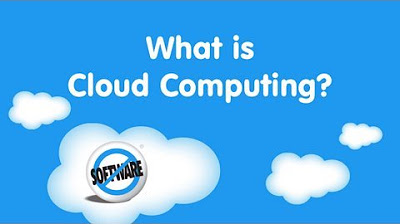What is Cloud Computing ? Cloud Computing Definition & Advantages by CloudSpace USA ( Houston, TX )
Summary
TLDRCloud computing offers businesses a flexible, cost-effective way to store, share, and access data from anywhere, at any time. By leveraging remote servers on the internet, businesses can eliminate the need for costly hardware, reduce maintenance expenses, and enhance productivity. Benefits include automatic software updates, instant upgrades, improved mobility, better collaboration, and secure data backup. Cloud solutions are scalable, reliable, and come with robust security features. CloudSpace USA provides all-in-one cloud computing services to help businesses streamline their IT operations while saving costs and improving efficiency.
Takeaways
- 😀 Cloud computing allows businesses to store and access data remotely, eliminating the need for physical hardware.
- 😀 Cloud-based storage is accessible from anywhere and on any device, providing flexibility and convenience.
- 😀 Cloud computing offers automatic software updates, saving businesses time and effort in maintenance.
- 😀 Instant upgrades with cloud computing introduce new features that enhance productivity and efficiency.
- 😀 Cloud computing boosts productivity by enabling easy sharing of information with employees and customers in real-time.
- 😀 The cloud improves collaboration by connecting dispersed teams and making information sharing seamless.
- 😀 Cloud services offer scalable storage, allowing businesses to easily adjust their storage capacity as needed.
- 😀 Data stored in the cloud is more secure and reliable than traditional hardware storage, with built-in backup and recovery features.
- 😀 Cloud computing is cost-effective, as it eliminates the need for large capital investments in hardware and software.
- 😀 Cloud platforms provide redundancy, ensuring that if one server fails, another takes over automatically to maintain service continuity.
- 😀 Cloud computing services prioritize security with layers of protection, including encryption, virus filtering, and 24/7 cyber monitoring.
Q & A
What is cloud computing?
-Cloud computing is the practice of storing and accessing data and applications over the internet, rather than on local hardware or personal devices. It uses remote servers to store and manage data, which can be accessed from anywhere at any time.
Why is cloud computing beneficial for small businesses?
-Cloud computing allows small businesses to store and access large amounts of data without the need for expensive hardware or IT infrastructure. It provides flexibility, scalability, and cost savings, which is especially important for small businesses with limited resources.
How does cloud computing improve accessibility to data?
-Cloud computing enables users to access their data from anywhere in the world, as long as they have an internet connection. This eliminates the need to be at a specific location or use a specific device to retrieve important files or work on projects.
What does it mean that cloud computing offers 'better reach'?
-Better reach in cloud computing refers to the ability for teams and individuals, no matter where they are located, to easily collaborate and share data. It facilitates virtual meetings, real-time project updates, and seamless communication, which enhances teamwork and relationships.
How does cloud computing improve business productivity?
-Cloud computing boosts productivity by enabling employees to access and share important information quickly from any smart device. It reduces the time spent on tasks like manual data entry and software updates, allowing businesses to focus on core operations and customer satisfaction.
What is meant by 'scalable storage' in cloud computing?
-Scalable storage refers to the ability to adjust storage capacity based on business needs. You can easily increase or decrease the amount of storage space you need without the need for upfront investments in hardware. Businesses pay only for the storage they use.
How does cloud computing ensure data security?
-Cloud computing platforms use multiple layers of security to protect stored data. These include encryption of data during transmission, spam and virus filtering, active cybersecurity monitoring, and regular antivirus protection. These measures help prevent unauthorized access and ensure data integrity.
What is the cost advantage of cloud computing for businesses?
-Cloud computing is cost-effective because businesses don’t have to invest in expensive physical hardware or software. They also save on maintenance, updates, and manpower since these services are provided by cloud vendors. Businesses only pay for what they use.
What happens if there is a failure in the cloud hardware?
-In the event of a hardware failure, cloud computing services are designed with redundancy in mind. If one server fails, another server automatically takes over, ensuring continuous access to data without significant downtime or data loss.
How does cloud computing assist with business continuity and data recovery?
-Cloud computing offers automatic data backup and quick recovery options. Since data is stored off-site in secure servers, businesses can easily recover lost information after a disaster or system failure, ensuring minimal disruption to operations.
Outlines

This section is available to paid users only. Please upgrade to access this part.
Upgrade NowMindmap

This section is available to paid users only. Please upgrade to access this part.
Upgrade NowKeywords

This section is available to paid users only. Please upgrade to access this part.
Upgrade NowHighlights

This section is available to paid users only. Please upgrade to access this part.
Upgrade NowTranscripts

This section is available to paid users only. Please upgrade to access this part.
Upgrade Now5.0 / 5 (0 votes)





